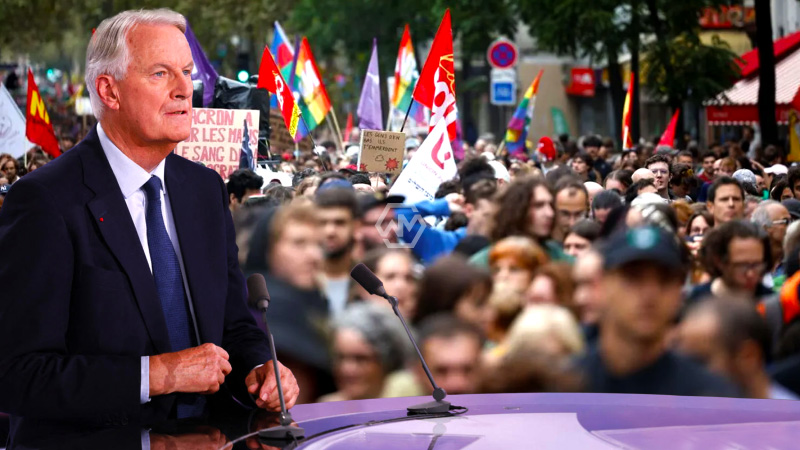- Nationwide protests erupted against Macron’s appointment of Michel Barnier as prime minister.
- Demonstrators argue that the choice disregards the left-wing victory in recent parliamentary elections.
- The protests, supported by youth organizations and left-wing parties, saw thousands rallying in major cities.
President Emmanuel Macron’s decision to appoint Michel Barnier as the new French prime minister has sparked widespread protests across the country.
Critics argue that this appointment undermines the results of the recent snap parliamentary elections, where the left-wing alliance, New Popular Front (NFP), emerged as the largest faction.
Macron’s Appointment of Michel Barnier Ignites Nationwide Protests
The protests, which began with youth organizations, quickly garnered support from major left-wing parties including France Unbowed, the Communists, and the Ecologists. Demonstrators across Paris, Marseille, Strasbourg, and other cities have voiced their frustration, with many feeling their votes have been disregarded. The atmosphere in central Paris was particularly tense, with thousands of people gathering to express their discontent.
Protesters, initially mobilized by youth organizations, were joined by various left-wing parties including France Unbowed and the Communists. They argue that Macron’s decision undermines the parliamentary majority held by the New Popular Front (NFP) alliance. The rallies, which took place in major cities such as Paris and Marseille, reflect the broader discontent with Macron’s handling of the political landscape.
In central Paris, the atmosphere was described as “charged up,” with estimates of between 2,000 and 8,000 protesters gathering to voice their grievances. Demonstrators have accused Macron of ignoring the left-wing mandate and criticized Barnier’s appointment as an attempt to circumvent the democratic process. The protests have highlighted the deepening political divide in France and the significant challenges facing Macron’s administration.
The outcome of these protests remains uncertain, but they signal a clear rift between Macron’s government and a substantial portion of the electorate. The demonstrations emphasize the ongoing struggle between the left and right in French politics and raise questions about the future direction of Macron’s presidency. As the situation develops, it will be crucial to monitor how these tensions impact France’s political stability and governance.
The widespread protests against Michel Barnier’s appointment highlight the intense political divisions in France and the significant backlash against President Macron’s decision. As tensions continue, the resolution of this conflict will be pivotal in shaping France’s political future.
“They’ve said things like they feel their vote has been stolen.”



